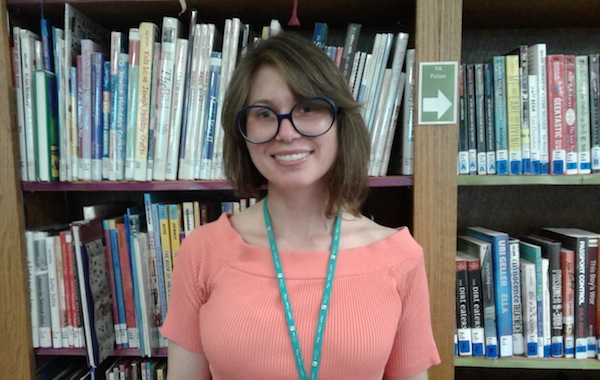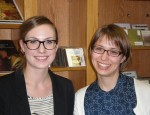Aviva Rotstein, full-time coordinator of the Isaac Waldman Jewish Public Library, is only the fourth person to head the facility. (photo from Waldman Library)
In a time of reduced social interaction, people have turned to books, videos, audiobooks and other pursuits to entertain and enrich. Libraries have had to find ways to deliver their services while maintaining strict protocols around cleaning and maintaining distancing.
For the Isaac Waldman Jewish Public Library, the last year has been a period of adapting to changing public health directives, and finding new ways to provide services to members and the public. Having marked its 25th anniversary in recent years, the library, located in the Jewish Community Centre of Greater Vancouver, like so many other agencies worldwide, turned on a dime to meet readers’ needs.
Aviva Rotstein had just taken over as interim library coordinator after the retirement of longtime librarian Helen Pinsky in December 2019. She became permanent coordinator in May. Guided by provincial rules and in coordination with the JCC, Rotstein and the library responded rapidly.
Like most of the world, the library shut down completely in March 2020, but continued providing access to ebooks and audiobooks online. New members joined specifically for these resources, said Rotstein.
In May, the library started offering curbside pickup and drop-off services, as well as launching a delivery service to Vancouver residents, later expanded to Richmond. By late summer, the library was open by appointment. It is now back to regular hours of 10 a.m. to 6 p.m. Monday to Thursday, and Sundays 10 a.m. to 1 p.m. Families are especially welcome on Sundays and kids’ storytimes can be arranged by request.
Cleaning protocols remain vigilant, with hard cover books and items like DVDs sanitized on return and other items sequestered before being recirculated.
Rotstein assumed the leadership of the library at this extraordinary time and she is one of a surprisingly small number of individuals – four, to be precise – who have headed the facility.
Talk of a Jewish public lending library began seriously almost 30 years ago. The first meeting of the JCC’s ad hoc library committee took place Oct. 29, 1991. The minutes include a brief synopsis of the Jewish community’s libraryscape. There were existing small libraries in synagogues and schools, as well as a Jewish Resource Centre, run by Betty Nitkin and aimed at educators, and a small Jewish library with no budget, run by Rita Weintraub.
While the Waldman Library is, to many visitors, a central part of the JCC experience, it was not a foregone conclusion when the building was being redeveloped in the early 1990s. Larry Barzelai, a family doctor who was on the board of the JCC, chaired the library committee.
The redevelopment of the community centre was the impetus for the push to get a permanent library, he said.
“We had to convince them that the library was a good thing to have,” Barzelai recalled. “My friend Karl Taussig was quite supportive of the library from day one. He was president of the JCC at that time.”
There were concerns about the economic viability of the project and the idea was not secured until Weintraub obtained the enthusiastic support of philanthropist Sophie Waldman. Waldman’s late husband, Isaac, was good friends with Weintraub’s husband, Marvin. Waldman saw the library project as a fitting tribute to her husband, who, she said at the time, “had a deep interest in education and agreed with Ahad Ha’am that the future survival of the Jewish people depends on learning through the richness of our literary heritage.”
With the library’s viability assured, any hesitation on the part of the JCC board dissipated.
“They were totally on side by the time the new JCC was built and the library took a prominent place in there,” said Barzelai.
After years of planning, the library opened with a literary splash on Nov. 15, 1994. Renowned Israeli author Amos Oz spoke on “Israel through its literature” and Rabbi Dr. Yosef Wosk affixed the mezuzah. (Wosk succeeded Barzelai as chair of the library board.)
The first librarian was Eric Pellow, who served a number of months until Karen Corrin began a 20-year run at the head of the library. Corrin had just finished library school when she was hired, but her previous work experience was ideally suited to the role. She had worked with the Vancouver Volunteer Centre (now Volunteer Vancouver) and, since the Waldman Library’s vision was to engage volunteers, Corrin’s combination of experience and skills was deemed an ideal fit.
From the start, she said, the Waldman Library was surprisingly unique. At conferences of the Association of Jewish Libraries, Corrin discovered there were very few community centres that had a public library independent of a school or as part of the local Jewish federation.
Corrin credits Rita Weintraub, who passed away last year, as the mobilizing force behind the project.
The purpose of the library was a matter of discussion and the first years were a time of learning, as new technologies in the world generally and libraries in particular were burgeoning.
“When I went to library school, it was just the beginning of the internet,” said Corrin. “When I got to the library, it was card catalogue … there was no computer system and that had to be developed.”
Figuring out what the community wanted in a Jewish public library was paramount, she continued. It was decided that it should be a lending library that is also a meeting place for everybody in the community – religious, secular, academic and avocational, all ages and interests, including resources in English and Hebrew.
“It is not an Orthodox library or Reform library, it’s a Jewish library,” said Corrin. “It meets the needs of the whole community.”
Like Corrin, Helen Pinsky had also just completed library school when she was tapped to lead the Waldman Library.
Pinsky was a lawyer who, after the last child took off to university, decided to make a shift herself and returned to study. Library people, she determined, were more her type.
“Lawyers were smart people who wanted to show off their smarts and were Type A and librarians were smart people who were curious and were Type B,” she said. “Going to university was a hoot in your 50s, oh my God. I was the bubbe of the group.”
While still a student, Pinsky spoke to Corrin about volunteering. She ran some storytime programs and filled in for other volunteers at the library. She completed her program in spring 2011 and then took the summer off.
“Come September, I decided one day that I’d better brush off my resumé and start thinking about actually doing something with this degree that I had just earned in May,” Pinsky recalled. “So I went to my computer and I found this very old copy of my resumé and was just looking at it and the phone rang and it was Karen, who said, hi Helen, have you graduated from library school yet? She said, congratulations. How would you like a job?”
Pinsky filled in while Corrin took a leave of several months, then worked as library assistant until Corrin retired in 2015. Pinsky retired on Dec. 31, 2019.
Reflecting on the meaning of a Jewish public library, Pinsky said, “I think it plays the role of any public library and then some. What is a public library to a community? It’s a place for gathering, it’s a place for learning, it’s a place for connecting, with knowledge, with information, with resources and with people.”
Rotstein, the latest in a short line of library leaders, is the first to have childhood memories of the place.
“When I was a child, I came into this library,” she said. “It’s very familiar.”
In addition to her long personal connection to the library, Rotstein sees the place in the context of a much larger connection.
“I think we provide a link to Jewish thought and imagination from the Jewish past and the present,” she said. “We offer a low barrier to participation as much as we can, and we strive to be an accessible and welcoming place for everyone. We try to uphold the Jewish value of learning and knowledge.”



